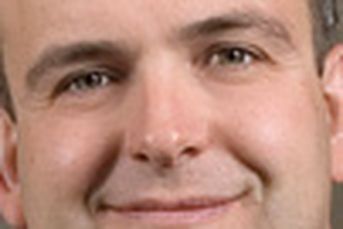CEO refocusing UBS on adviser strength, wealthier clients
UBS Wealth Management Americas, the profit-starved U.S. retail-brokerage unit of UBS AG, will rebuild its reputation and revenue by marketing the advisory strength of its brokers and minting better products for wealthy investors, its new chief executive told brokers last week in outlining his strategy for the firm.
UBS Wealth Management Americas, the profit-starved U.S. retail-brokerage unit of UBS AG, will rebuild its reputation and revenue by marketing the advisory strength of its brokers and minting better products for wealthy investors, its new chief executive told brokers last week in outlining his strategy for the firm.
Robert McCann, who joined UBS in October after a career spent primarily at Merrill Lynch & Co. Inc., told brokers that he will allocate resources to attract clients with $1 million or more in investible assets in large markets such as New York, Chicago, Los Angeles and San Francisco. Mr. McCann has no immediate plans to shutter other branches or to cut off less affluent clients, but he will focus on markets with the highest potential, said UBS spokesman Kris Kagel.
In telling the firm’s approximately 7,000 advisers that they and their wealthy clients will be the focus of the franchise, Mr. McCann was not only attempting to improve morale at a company that has been losing income and brokers in the past two years but also to reverse the legacy imposed on the former PaineWebber Inc. brokerage channel by its Swiss banking parent.
“We got off track a few years ago by trying to bring the European model to the U.S.,” Mr. McCann said in March in front of UBS chief executive Oswald Gruebel at a meeting of U.S. managing directors. “In the U.S., it’s all about the financial adviser … unlike other countries, where the firm or the bank supersedes the adviser.”
In addressing his midsize brokerage force last Wednesday, Mr. McCann said he has no plans to try to catch up with larger rivals such as Morgan Stanley Smith Barney LLC and Bank of America Corp. that are burdened with integrating their operations after mergers. He preached the virtues of taking a middle ground that will allow UBS to offer the global products and services of the giants with the relative nimbleness of a regional brokerage firm.
In recent months, Mr. McCann has been working to support such nimbleness by cutting out layers of bureaucracy. Just last month, the bank fired about 200 managers and back-office workers.
Mr. McCann also acknowledged that his management team must stem the exodus of high-producing brokers. He cited a new production-based bonus plan dubbed Growth Plus and promised to increase education and training programs.
UBS, which had more than 10,000 brokers early in the past decade, lost hundreds of brokers in the past two years as it was battered by headlines about billion-dollar trading losses, tax fraud and auction-rate-securities abuses.
At the meeting in March, Mr. McCann noted that brokers who leave take more than 80% of their clients’ assets with them. He then spelled out the consequences: UBS Wealth Management Americas made “literally no pretax profit” on about $5 billion of revenue in 2009.
At last Wednesday’s meeting, Mr. McCann repeated his target of booking pretax annual profit of about $1 billion — with a profit margin ranging between 15% and 20% — over the next few years.
Mr. McCann did not mention his former employer, Merrill Lynch, by name. But in last month’s talk, he said that BofA Merrill, Morgan Stanley Smith Barney and Wells Fargo Advisors are all products of shotgun weddings and are burdened by proprietary, product-driven sales cultures.
“They are product manufacturers, and they are product pushers,” he said. “Their clients will feel it, and that will be an opportunity for us.”
James Wiggins, a spokesman for Morgan Stanley, who previously worked with Mr. McCann at Merrill, disagrees with that assessment. “It’s a complete mischaracterization of our business model,” he said. “Our architecture is just as open as UBS’. Our advisers are just as objective.”
At Wells Fargo Advisors, which includes the former Wachovia Securities LLC and A.G. Edwards Inc. brokerage forces, “open architecture and product neutrality are fundamental to our core and always have been,” spokeswoman Teresa Dougherty said. “We’ve never wavered from that ideal, nor from the value that we place behind the [financial adviser]-client relationship.”
Representatives at BofA Merrill did not return calls for comment.
Mr. McCann, who has hired at least five former Merrill executives for his management team, told brokers last week that he is working to provide some new products for them, particularly on the liability side. He mentioned specifically mortgage products and credit cards, Mr. Kagel said. The CEO earlier had talked about the desire for more securitization and insurance products as well.
E-mail Jed Horowitz at [email protected].
Learn more about reprints and licensing for this article.




